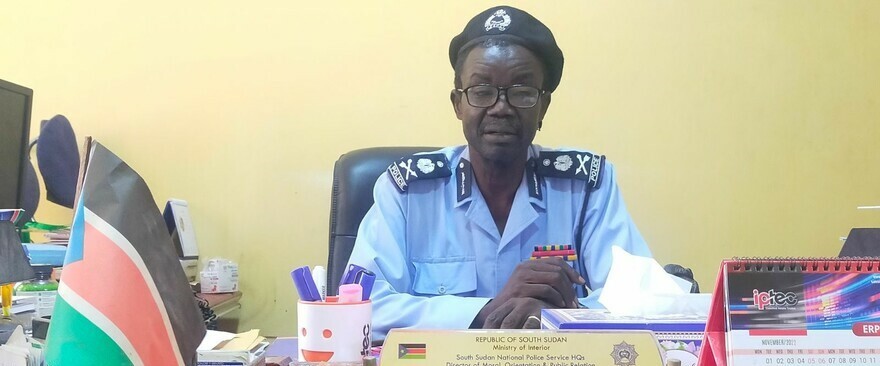Media institutions and civil rights activists voiced concerns on Wednesday regarding a recent directive by the South Sudan Police Service that limits media interactions with the police. According to the order, all communication between the police officers and the media must receive prior approval from the police headquarters.
Police Spokesperson Maj. Gen. Daniel Justin has directed journalists and media practitioners to avoid obtaining information from unauthorized police officers. Daniel Justin says no one is allowed to speak on behalf of the police service apart from him or police commissioners and inspectors at the state and county levels.
Koang Pal Chang, the chairperson and executive board member of the Association for Media Development in South Sudan (AMDISS), raised concerns about the limitations imposed by the police order. He highlighted the challenges of communication infrastructure in South Sudan and the vast geographical distances obstructing rapid information dissemination.
“Most of the states have handled issues without informing the headquarters here, so how do you expect the spokesperson of the police here in Juba to respond to the incident in Wau or Aweil or Renk? And with the challenges we have in communication, it is an issue. There are a lot of challenges in communication infrastructure. There is a challenge of roads, even in Bor; you have to take several hours to reach Bor, which is near Juba,” he said.
He emphasized that the order would severely limit public access to information, particularly in rural areas.
“AMDISS fears that this new restriction announced by the police spokesperson will create an information gap and keep the people uninformed about issues of public concern, especially at the rural and grassroots level. So, it has no logic because the police can be used as a source and an eyewitness. In this instance, the police are an eyewitness, and the policeman or woman can speak on behalf of the police,” Pal added.
He intended to engage with the police spokesperson to enable state police spokespersons to communicate with the media.
Oyet Patrick Charles, President of the Union of Journalists of South Sudan (UJOSS), concurred with Pal’s concerns, stressing that the police spokesperson’s order would hinder the flow of information to the public, especially regarding events in the country’s remote regions.
Oyet suggested that allowing spokespersons at the state level to provide information to the media and the public would be a more practical approach.
He stated, “There are things that will happen in the states, and those police officers know better than even the person at the national level. They have information at hand. Suppose you will say that the only people who should speak should be at the national level. In that case, you are going to delay information getting to the public because when something happens, the person who is the spokesperson at the national level is not aware.”
Merekaje Lona, a civil rights activist, expressed her disapproval of the police spokesperson’s order, asserting that it obstructed public access to information and contradicted the fundamental human right of access to information.
She called on journalists to engage with the police spokesperson to seek a more viable solution. Lona pointed out, “It creates a very awkward context because then it means the country is going to be quiet; the only way to hear from the spokesperson is instantly away from the capital where the police spokesperson is. How are the journalists from that location going to find the spokesperson? In a nutshell, this may not favor all sides; it needs to be reviewed.”




